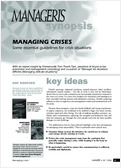Prepare for crises before it's too late!

Companies often suffer from perfectly predictable crises for which they did absolutely nothing to prepare. What measures to adopt to prevent crises from happening or to reduce their effects?
In the small town of Marchezais in the French county of Eure and Loir, the Alimex chicken farm was humming along without a care in the world when suddenly, it was accused in 1999 of having given its chickens dioxin-tainted feed. Although this suspicion later turned out to be unfounded, it cost the small company millions of euros.
In September 2001, Arthur Andersen was a prosperous auditing and consulting firm known and respected the world over. A few months later, in the aftermath of the Enron scandal, it announced that it was closing shop.
No company, however small or large, is completely safe from a major crisis that could spell disaster. As this fact sinks in with executives, more and more are signing up for crisis management seminars.
Knowing what to do in a crisis is not enough, however. Experience shows that much remains to be done in terms of preventative action. Indeed, not all crises come out of the blue – many are quite predictable, as they result from known problems or are preceded by clear warning signs. Even so, companies are often caught unprepared.
The publications that we have selected show how to implement an effective prevention policy, and underline three key messages in particular:
– Learn to identify the warning signs that almost always precede an impending crisis.
– Try to neutralize the defensive mechanisms that tend to drive companies to underestimate the risks of a given situation.
– Make sure that preventative action is not hobbled by those who have an interest in ignoring the risk of crisis.
SubscriberSign in
to download
the synopse (8 p.)
VisitorI want to buy
this synopsis (8 p.)
VisitorI want
to subscribe
See also

Preparing for an uncertain future
In times of turmoil and strong uncertainty, how can you manage beyond simply coping with the situation? One solution consists in accepting the inevitable nature of uncertainty: the challenge does not consist in minimizing it, but in managing it.

Increase the resilience of your organization
All organizations are confronted with the risk of crises. Rather than vainly attempting to avoid them, you had better develop the capability to absorb them and to learn the lessons. How can you acquire and cultivate resilience?


![Gérer et décider en situation de crise [Managing and Deciding in Times of Crisis]](images/ouvrages/l/2355.jpg)

